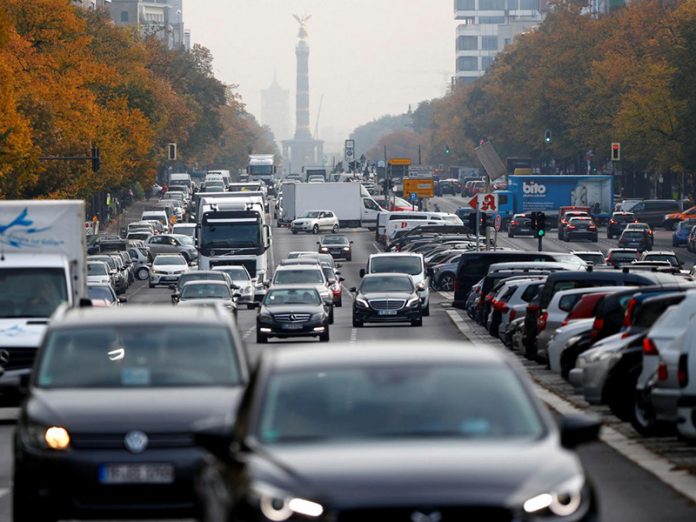By Stefan Krause and Boris N. Liedtke
The German diesel car industry still claims its innocence on the air pollution accusations that have bombarded it in the past few years. But comes along a new player in the field – electric cars. How will the emerging e-car industry affect the people’s on-going demand for a greener Germany? Does a revolutionary e-car brake system – said to reduce fine particle emissions – have what it takes to replace diesel cars?
There is a green revolution developing in the large cities of Germany. Following pressure from environmentalists and citizens who suffer from breathing difficulties such as asthma, pulmonary disease and allergies, many German city councils have taken drastic steps to disallow the use of diesel cars on certain roads of inner cities. In the case of Stuttgart, arguably and ironically the capital of the German car industry with headquarters for Mercedes, Porsche and Bosch, the city went even further and banned the use of diesel combustion engines in the entire city and its suburbs. The impact on the automobile industry and owners of diesel cars are dramatic, so it is only natural that they are fighting back. At stake are hundreds of billions in value for car owners and hundreds of billions of intangible assets in patents, logistic chains and production know-how for the traditional automobile industry.
Unfortunately, city policies are frequently cynical as well as inconsistent in their implementation. They’re cynical because in most cases the city politicians demand a standard from their population, which is beyond what they demand of themselves. Diesel owners are no longer allowed to use their cars in the inner city but city owned, public vehicles are exempted from these restrictions. Therefore diesel car owners are complaining bitterly about being de facto expropriated of the use of their investment in their automobile, while the city drives happily around in old buses and trucks that are polluting. Politicians should hold themselves and their administration to a higher standard than the governed population, not the other way around. In addition, the policies are inconsistent because the science and analysis around the pollution of combustion engines shows little difference between health damage caused by diesel vehicles compared to petrol engines. The level of pollution correlates more with the age, technology and maintenance of the vehicle rather than with the type of fuel used. It matters little if the combustion engine is driven by diesel or fuel. The only currently practical and feasible solutions are battery powered electric vehicles.
[ms-protect-content id=”9932″]
As the resale values of diesel cars in Germany are dropping and the sale of new diesel cars is plummeting, the automobile industry is hitting back in a desperate attempt to salvage their substantial investment in diesel technology for as long as possible. The resulting court cases between the industry and the diesel car owners against the city councils and broad population focus on the measure of fine air particles and debating the levels of when these become health threatening. Both sides have several points to argue. The diesel owners insist that the acceptable levels of fine particles in the air are arbitrary, the measurement stations are unfairly located, there is no proven correlation between fine particles in the air and health risks, allegedly the ocean spray along coastlines cause more fine particles than traffic, etc.
By quoting their own expert studies, the diesel engine opponents argue facts full of horror and health doom. One example is an analysis by the World Health Organisation (WHO) on ambient air pollution contributing to 6.7% of all deaths worldwide; in particular 16% of lung cancer, 11% of chronic obstructive pulmonary disease and 20% of ischaemic heart disease and strokes. The WHO estimated that in the European region alone, air pollution caused 600.000 premature deaths with an estimated financial damage of over EUR1.5 trillion in 2010 alone. It is questionable whether it’s appropriate to financially measure such human tragedy
The discussion has escalated emotionally and fundamentally to such high levels that managers from automotive companies and suppliers even claim, “A modern Diesel [engine] cleans the air.” These questionable statements certainly do not help the credibility of the industry – an industry that has been caught developing technology with the sole purpose to cheat emission testing. The public and politicians take little notice of these comments and rightly dismiss them as trivial claims by an industry that has been sleeping for decades and is now fighting for survival.
As further advantages of the electric car emerge through technological progress and more scandals around the combustion engine surface, the self-serving position of the traditional car industry in favour of the combustion engine will become as untenable as the resale price of diesel cars.
One of these examples is the benefit that electric drivetrains have when braking. As frequently argued by defenders of the old technology, all diesel engines of privately owned vehicles in Germany merely account for 22% of the fine particles emissions (PM-10) from traffic. They point towards other sources of particle related pollution such as the wear and tear of mechanical brake pads (8%). Fine particles from braking pads are particularly vicious for our health as they are frequently composed of iron, copper, asbestos and other metals, which can cause inflation in our lungs and therefore increase the risk of cancer. Compared to these, fine particles such as salt crystals from the ocean spray are even considered healthy by some.
There is a significant benefit of an electric car that has been widely ignored. Going back as far as 1894, the French electric automobile pioneer Louis Antoine Krieger introduced a feature that allowed the engine, which normally drove the front wheels of the electric car to work in reverse as a generator while slowing down the vehicle without activating the traditional brakes. Of course at that time the idea behind this innovation was not to reduce fine particles but to recover kinetic energy from the vehicle’s forward movement and turn it into electric energy to recharge the battery.
This feature also produces a considerable braking effect that avoids, in difference to traditional mechanical brakes, fine particle emissions. This regenerative braking can be particularly useful in city traffic with its constant start and stop movement. The forward motion, for which valuable energy has been used up in acceleration, is recycled to the battery instead of wasted. For example Audi AG claims that this technology already contributes 30% of the 400km maximum range of its top SUV model. The technology surrounding this method of braking is still in its infancy as investment in R&D for the electric vehicle has only recently started to take off. Nevertheless, firms such as Tesla have already different strength de-acceleration levels for their vehicles. It will only be a matter of time before e-cars will use traditional brakes exclusively in emergencies. Most of the speed reduction will be achieved through regenerative braking technology. For the driver this will be seamless as he or she presses the brake pedal; the energy from forward motion will be used to recharge the battery, slow down the vehicle and subsequently avoid any fine particles being emitted. This will be a financial challenge for all automobile suppliers who have significant investments in brake technology.
Bosch is one such firm. In 1978, Bosch became the first firm to build and deliver an electronic four-wheel multi-channel anti-lock braking system (ABS) as an option for the Mercedes-Benz W116. The technology was revolutionary as it avoided the locking up of the wheels during an emergency stop, increased the control of the driver in such a situation and even shortened the brake distance required.
Funny enough, and as a good parallel to today’s discussion, this advanced technology was initially met by scepticism from those with a vested interest in the existing solutions. Competitors warned that ABS was in fact dangerous for the user as those cars with ABS would come to a halt faster than others and hence increase the risk of rear-end collisions between cars.
The ridiculous claim that progress in braking technology was detrimental caused a significant delay in the introduction and adoption of ABS. This resistance arguably lead to hundreds if not thousands of unnecessary accidents, injuries and traffic related deaths. Only in 1987 did ABS become standard in all Mercedes-Benz vehicles. Other manufacturers followed shortly afterwards. Since then Bosch has been profiting handsomely from its associated patent rights and remains one of the key market players in braking technology.
And again, today we observe the same attitude. Instead of embracing the new technology and shift R&D investment into the future, valuable time, effort and credibility are used up to defend the past.
The credibility of the automobile industry and its suppliers has already been seriously damaged through systematic and organised fraud. It doesn’t serve its customers, the population or its shareholders to continue to damage their own credibility by making more outrageous claims defending the combustion engine and attempting to disqualify the electric car. It is time for the industry to embrace the future by putting cleaner e-cars with cleaner braking technology into our cities and abandon the ridiculous claim that combustion engines are not a health hazard. So give us a Brake – a Regenerative Brake!
[/ms-protect-content]
About the Authors
 Stefan Krause is CEO and Founder of Canoo, an electric vehicle company addressing the future needs of urban mobility. He has over 30 years business experience, including 14 years experience as a Management Board Member of German Blue Chip companies. Prior to this, he had a dynamic career building tenure at BMW that began in 1987. He holds a Masters in Business Administration from the University of Würzburg in Germany and serves as the President of the Schmalenbach-Gesellschft, a prestigious academic and business association in Germany.
Stefan Krause is CEO and Founder of Canoo, an electric vehicle company addressing the future needs of urban mobility. He has over 30 years business experience, including 14 years experience as a Management Board Member of German Blue Chip companies. Prior to this, he had a dynamic career building tenure at BMW that began in 1987. He holds a Masters in Business Administration from the University of Würzburg in Germany and serves as the President of the Schmalenbach-Gesellschft, a prestigious academic and business association in Germany.
 Dr Boris N. Liedtke is the Distinguished Executive Fellow at INSEAD Emerging Markets Institute and has over twenty years experience in the financial sector. He was the CEO of the largest bank by assets in Luxembourg and board member for Operations at the largest German fund manager. He is author of numerous articles on finance and trade as well as having received his PhD from the London School of Economics for the publication of Embracing a Dictatorship by MacMillan.
Dr Boris N. Liedtke is the Distinguished Executive Fellow at INSEAD Emerging Markets Institute and has over twenty years experience in the financial sector. He was the CEO of the largest bank by assets in Luxembourg and board member for Operations at the largest German fund manager. He is author of numerous articles on finance and trade as well as having received his PhD from the London School of Economics for the publication of Embracing a Dictatorship by MacMillan.


































